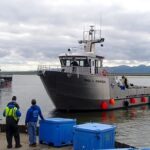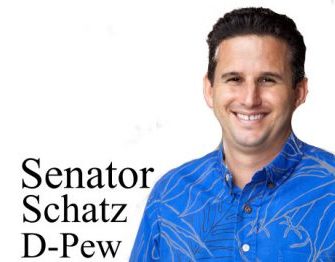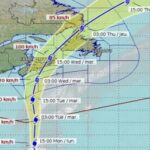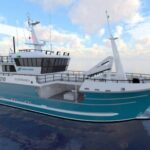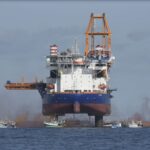Message from Commissioner Keliher: Federal Budget Package Includes Pause on Whale Regulations and Needed Funding for Research
 Finally, some good news for Maine’s lobster industry.
Finally, some good news for Maine’s lobster industry.
Today, the U.S. House of Representatives followed the lead of the U.S. Senate and voted to approve the omnibus spending bill to fund the federal government. This budget package includes a six-year pause on new federal whale regulations, money to gather needed data including the presence of whales and phytoplankton, and funding for the development of innovative gear technology that will keep the fleet fishing. We expect the President to sign this legislation in the coming days.
Here are the major provisions:
- Postpones implementation the next phase of federal rulemaking for the lobster fishery under the Atlantic Large Whale Take Reduction Plan (ALWTRP) for six years. New regulations will need to be in place by December 31, 2028. This is a much-needed pause in a process that was setting this industry up for serious economic hardship.
- Provides $2,000,000 for partnerships among State agencies, academia, and industry to address American lobster research in the Gulf of Maine, Georges Bank, and southern New England. The research will explore the impact of whale protection measures on the resource and the fishery.
- Provides $6,000,000 for NARW-related research, monitoring, enforcement, and conservation efforts. A better understanding of NARW abundance and distribution will be critical to the development of future regulations that protect whales without unnecessarily impacting industry. At least half of this funding will be used for vessel surveys, passive acoustic monitoring, habitat and plankton monitoring, habitat modeling, and potentially whale tagging in the Gulf of Maine. This is the type of research and monitoring that we believe will lead to better modeling and more targeted risk reduction measures in the future. Along with aerial surveys, it may also enable dynamic management of closed areas based on whale presence, which would be a better, more targeted solution than large, static seasonal closures.
- Provides $1,500,000 to support continued development of ropeless gear technologies. The research will focus on issues important to industry such as gear location, gear conflict avoidance, and enforcement.
- Provides $26,000,000 through the Atlantic States Marine Fisheries Commission for distribution among affected States. This funding can be used for a range of purposes, including offsetting costs of compliance with the 2021 rule and electronic monitoring requirements, or research to inform future regulatory actions, including development of a dynamic management program or new gear technologies.
- Authorizes and provides $20,000,000 in funding for Fiscal Year 2023 for a new grant program to be administered by the National Fish and Wildlife Foundation. Funding will be available for research and development of new gear technology that will reduce lethal and sub-lethal effects of human activities on right whales, development of dynamic management approaches, and training on how to use newly developed technologies. Eligible recipients include states as well as nonprofits, research institutes and universities who partner with states or fishing industry members and groups.
- Directs NOAA to work with States and other stakeholders to improve the Decision Support Tool (DST), with a goal of reducing the uncertainty that has hampered the effectiveness of the DST in determining risk.
- Encourages NOAA to revise whale population models using “most reasonably certain to occur” rather than “worst case” scenarios and assumptions, and to incorporate better data that allows more accurate predictions of future NARW populations before issuing any new regulations.
Thanks to the extraordinary efforts by Senator Collins, Senator King and Representatives Pingree and Golden, who coordinated closely with Governor Mills to accomplish this legislative action, this package provides the time and resources needed to gather better data and develop workable gear changes before further regulations are implemented.
I need to give special thanks to the staff of our congressional offices who worked tirelessly day and night, well into the wee hours of the morning, for many days, to help make this all happen. I also want to thank MLA’s Patrice McCarron and MLU’s Ginny Olsen who made themselves available, day and night, for us to bounce language off and verify if the MLA and MLU could live with compromises as the playing field changed by the hour and sometimes the minute. MLA and MLU both played critical roles over the last few weeks that helped get this effort over the line.
I would also be remiss if I didn’t thank DMR staff, most notably Deputy Commissioner Meredith Mendelson, who was working with me on this during every waking hour.
This Congressional action also does not mean that this is the end of our work in the courts. We are still actively developing our brief for the appeal in the MLA lawsuit and will keep you apprised on both cases as they progress.
What it does mean is that now we have the time we’ve needed to work on the future of the fishery. This win doesn’t mean we can sit back and wait for things to change – we must actively work on gathering data, challenging the science, improving the models and developing gear that works.
Yes, there is much work to do over the coming months and years– we can’t rest yet. The federal laws will still be used to develop rules that will be implemented in 2028 and beyond, so in the meantime we must ALL WORK TOGETHER and determine the path forward.
I will continue to provide updates as these issues progress, but I’m happy to be able finally to share good news with you as we head into the holidays.
I look forward to seeing you in the new year and in the meantime wish you a healthy and safe 2023!
Merry Christmas!
Pat
Patrick Keliher
Commissioner
Maine Department of Marine Resources




































